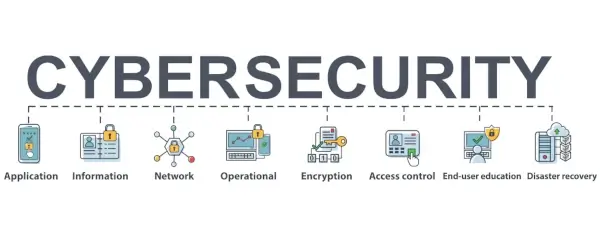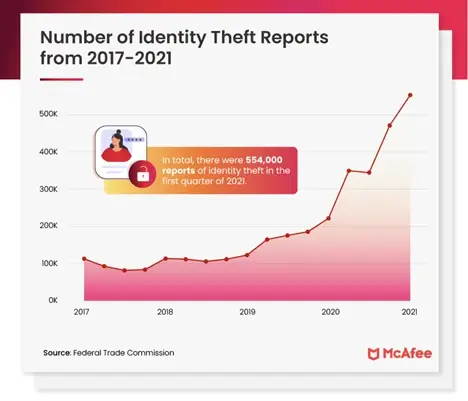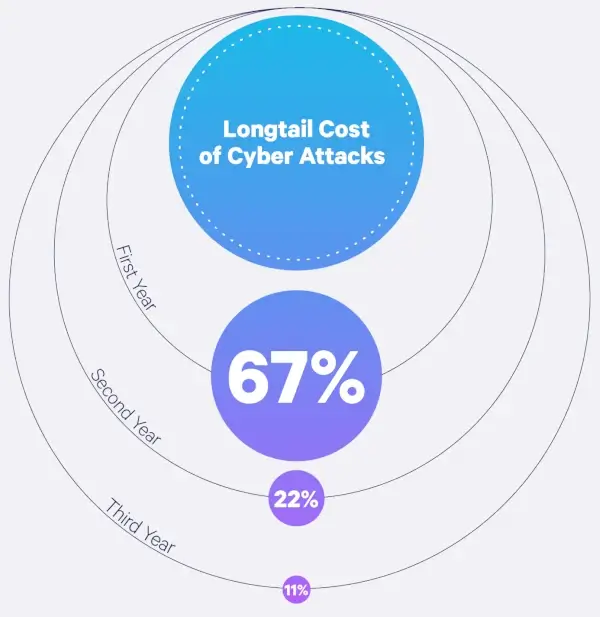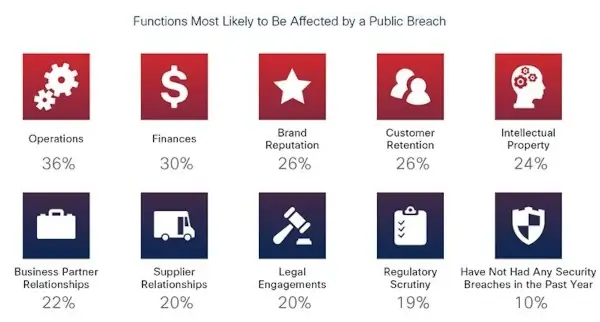
In an online age, cyber security is more crucial than ever. It is essential to do business, socialize, and store sensitive information. It is crucial to stay secure online. Whether it's ransomware, phishing emails, or data breaches, countless potential sources of attack can have huge implications and expensive consequences.
To keep data secure from cyberattacks, businesses must invest in robust cybersecurity solutions tailored specifically to their needs. Doing so will help ensure that their sensitive data remains safe no matter what kind of threats they may face in the future.
The threats of data breaches and access from malicious third parties have made it essential to understand the importance of cyber security. This blog post will provide you with the basics of cyber security.
What Is Cyber Security?
Cyber security combines technologies, processes, and practices to protect networks, systems, and data from cyberattacks. It covers everything from personal computers to enterprise networks and cloud systems. It can also include the protection of critical infrastructures, such as power grids and transportation systems.
Cyber security is critical for individuals, businesses, and governments; it applies to any entity that uses or stores sensitive data or interacts with the internet in any way. The importance of cyber security extends to user education and disaster recovery, as this graphic shows.

It contains several aspects, such as risk management, incident response, disaster recovery, access control, encryption, and more. These components work together to ensure that your business and its information are safe from malicious actors.
Both individuals and organizations can implement cyber security measures to protect data from being accessed or stolen.
What Is The Importance Of Cyber Security?
Data breaches may lead to identity theft, financial loss, reputational harm, and costly legal fights for people, corporations, and governments. As a result, companies must invest in effective cyber security procedures to protect their data and reputation against cyberattacks.
Let's go further into the importance of cyber security and how it can protect you.
1. Protect Sensitive Data
Having the proper measures to protect sensitive data means you can rest assured that information will remain secure even if a breach occurs.
Encryption is one of the most critical cyber security measures. Encryption scrambles data, so only a unique key or password can decrypt it. So even if someone gains access to your system or network, they can't access your personal information without the key or password.

Another way to protect data is to implement access controls, which restrict who can access specific data. Organizations can also implement intrusion detection and prevention systems, which can help identify and prevent unauthorized access to data.
Cyber security also includes two-factor authentication and biometrics, which make account access harder. It requires users to confirm their access through email verification or code.
Cyber security may offer phishing protection. Anti-phishing software alerts users when they receive emails containing harmful links or attachments, decreasing the risk of identity theft. Such software also blocks out any credential-stealing malware from accessing a system.
Some anti-phishing software includes Cofense, GreatHorn, and Ironscales. Here's a screenshot that shows how it may appear when you use this software.

A SMART approach combined with the proper tools helps protect your critical data and allows you to respond swiftly. By scanning signals that have penetrated your system and acting quickly, you may better secure your sensitive data and avoid any damage.
2. Ensures Smooth Business Operations
Businesses rely on customer data to function properly. For example, eCommerce and SaaS marketing strategies require collecting data such as email addresses, locations, etc.
Cyber security helps businesses protect critical systems holding this data. It protects customer databases, financial records, and intellectual property from malicious attacks or data breaches. Moreover, it helps to ensure that all internal networks remain private and secure from external threats.
To achieve effective cyber security measures, businesses must have the appropriate tools and processes. This includes comprehensive policies and procedures outlining the steps to safeguard confidential information. It also requires the implementation of secure communication technologies, such as encryption and two-factor authentication, which can help prevent unauthorized access to critical corporate data.
Additionally, businesses should regularly conduct penetration tests of their systems to identify weak points within their security protocols that could be exploited by hackers or other malicious actors.
Numerous resources are available to help organizations develop effective cybersecurity strategies tailored specifically for their industry sector or business. These resources range from training courses and workshops on best practices to consulting services with specialized expertise in cyber security solutions.
Such strategies will provide a layer of protection from cyber threats and help ensure the continuity of operations throughout any organization.
3. Prevents Identity Theft
Identity theft is a growing problem, and cyber security measures are necessary to protect yourself. Cybercriminals use various methods to steal personal information, such as phishing emails, malware, and spoofed websites. Unfortunately, criminals can exploit flaws in many systems that allow them to access sensitive data.
The graph below shows the number of identity theft reports between 2017 and 2021. Identity theft cases increased dramatically, from slightly over 100,000 in 2017 to over 500,000 in the first quarter of 2021.

However, there are various steps organizations and individuals can take to protect themselves from identity theft. This includes implementing strong passwords, encrypting networks and data, investing in firewalls, monitoring your servers and firewalls for suspicious activity, and regularly updating software on computers and mobile devices. Setting up a firewall and periodically updating your virus protection software are practical measures to secure your information.
If you store important information on the cloud, consider investing in encryption tools to safeguard sensitive data. Some encryption tools include Folder Lock, AxCrypt, and VeraCrypt.
Additionally, you can use tools such as two-factor authentication or biometric security systems for extra layers of protection. By implementing these cyber security measures, you can increase the security of your online accounts and help prevent identity theft.
4. Saves Cost
By 2025, it is predicted that global economic losses due to cybercrime will total $10.5 trillion annually. Cybersecurity technology can help companies save or avoid costs ranging from breach response to legal services fees.
Companies should be aware of or prepared that the costs of a data breach may not be fully known or tallied for months or even years. Here is an overview of the effects of a cyberattack on a firm from its first to its third year in operation.

Here are some ways cyber security can help save costs:
- Prevention of data breaches: According to stats, the cost of the total global breach is estimated at $4.85 million. By investing in cyber security strategies, you can reduce your risk of a data breach and save money in the long run.
- Increased efficiency: When you have proper protections in place, you can be sure that your systems are running optimally and securely, which will help you eliminate downtime and ensure your team is as productive as possible.
- Reduced insurance premiums: Cyber insurance premiums can be expensive, but they are necessary to protect your business in case of a data breach or other cyberattack. However, you have robust cyber security practices and systems. In that case, you may be eligible for reduced premiums as insurance companies recognize that you're less likely to face a data breach or cyberattack.
Cyber security may cost money upfront, but it will save you from costly damages.
5. Protects Your Business Reputation
Cyberattacks and data breaches can negatively affect an organization's reputation. Cyber security helps you protect your hard-earned reputation. Investing in cyber security can assure customers and help businesses build trust with their clients by providing the highest levels of support.
By protecting your business website and online presence from attacks, your customers will continue to access your site, not tarnishing your reputation. Additionally, those in your network will continue to be loyal and trusting of you.
The following Cisco report outlines the issues you may face from cyberattacks, and some of them may impact your reputation directly or indirectly.

Cyber security also ensures that customer data is kept secure, protecting customers' personal information and maintaining customer trust.
For example, if customer data such as credit card numbers were leaked due to a cyberattack, customers would see it as irresponsible, potentially resulting in lost business.
Cyber security measures help to prevent these types of incidents from occurring in the first place. It can also help detect malicious activity before any damage is done, allowing businesses to respond quickly and mitigate potential risks.
Being proactive with cyber security prompts customers to trust that the company takes their privacy seriously and tries to protect it.
In Closing
Cybersecurity is an invaluable tool for businesses of all sizes. It's not just about protecting yourself—it's about protecting everyone who interacts with technology from malicious actors seeking to exploit vulnerabilities in networks and systems for personal gain or political advantage.
Implementing cyber security measures has several benefits, including:
- Protecting sensitive data
- Preventing identity theft
- Saving costs
- Ensuring smooth business operations
- Protecting your business reputation
Its essential role in protecting sensitive data and maintaining customer trust cannot be overstated. It also comes with a perk many business owners would appreciate—saving them money.


 Copyright 2000-2026, WebSitePulse. All rights reserved.
Copyright 2000-2026, WebSitePulse. All rights reserved.